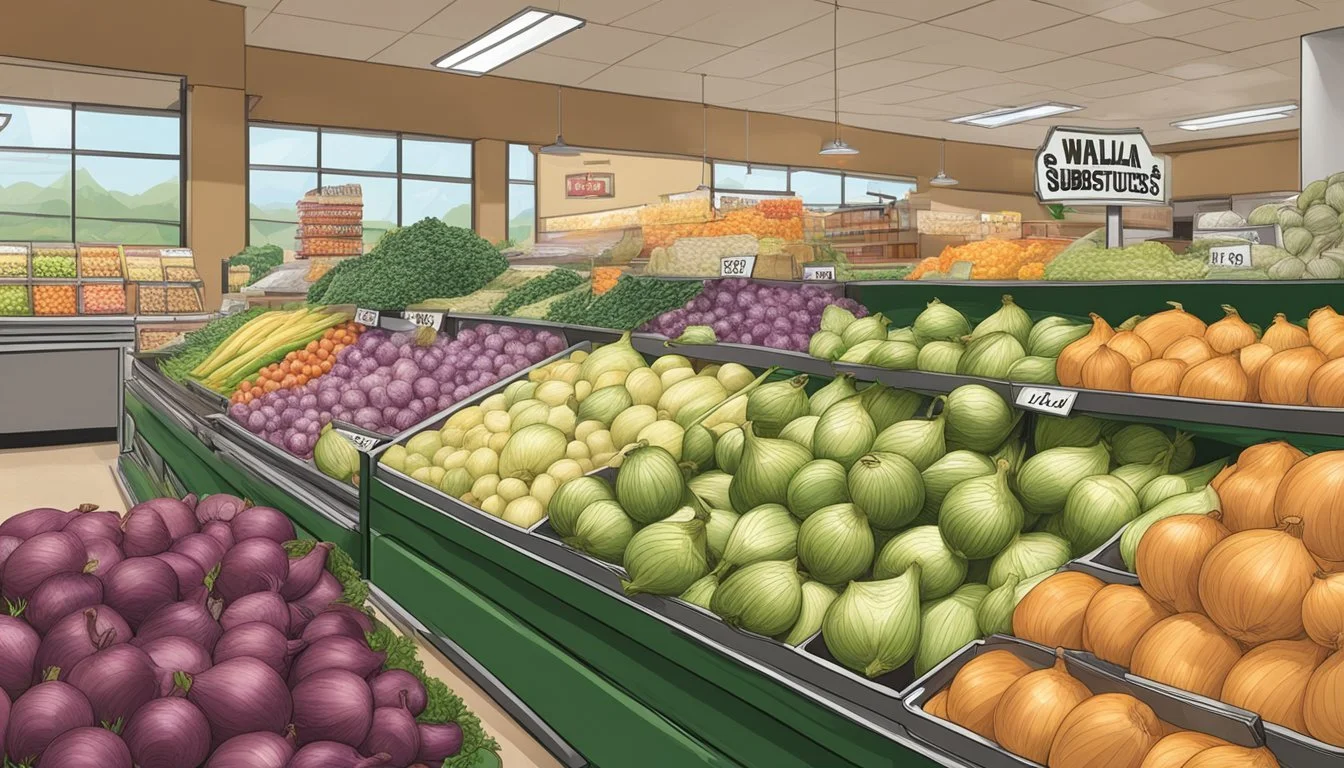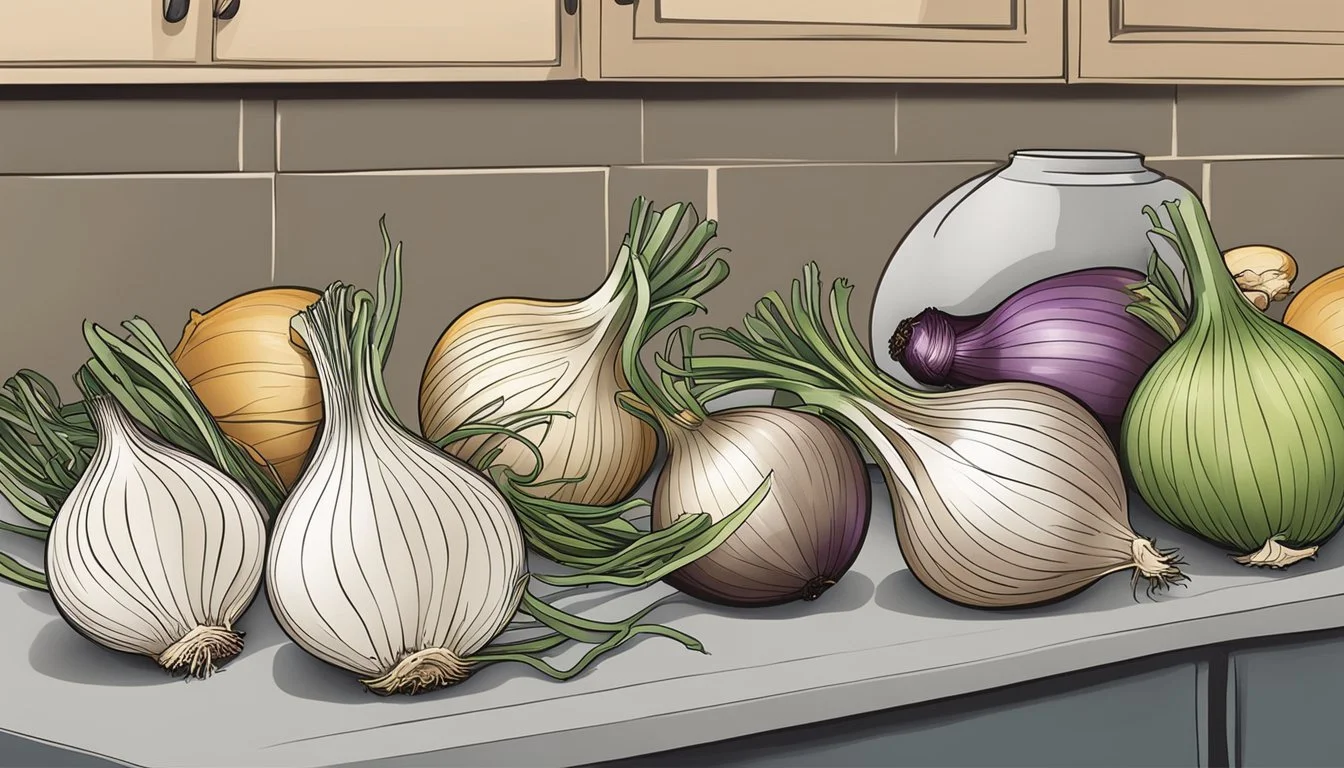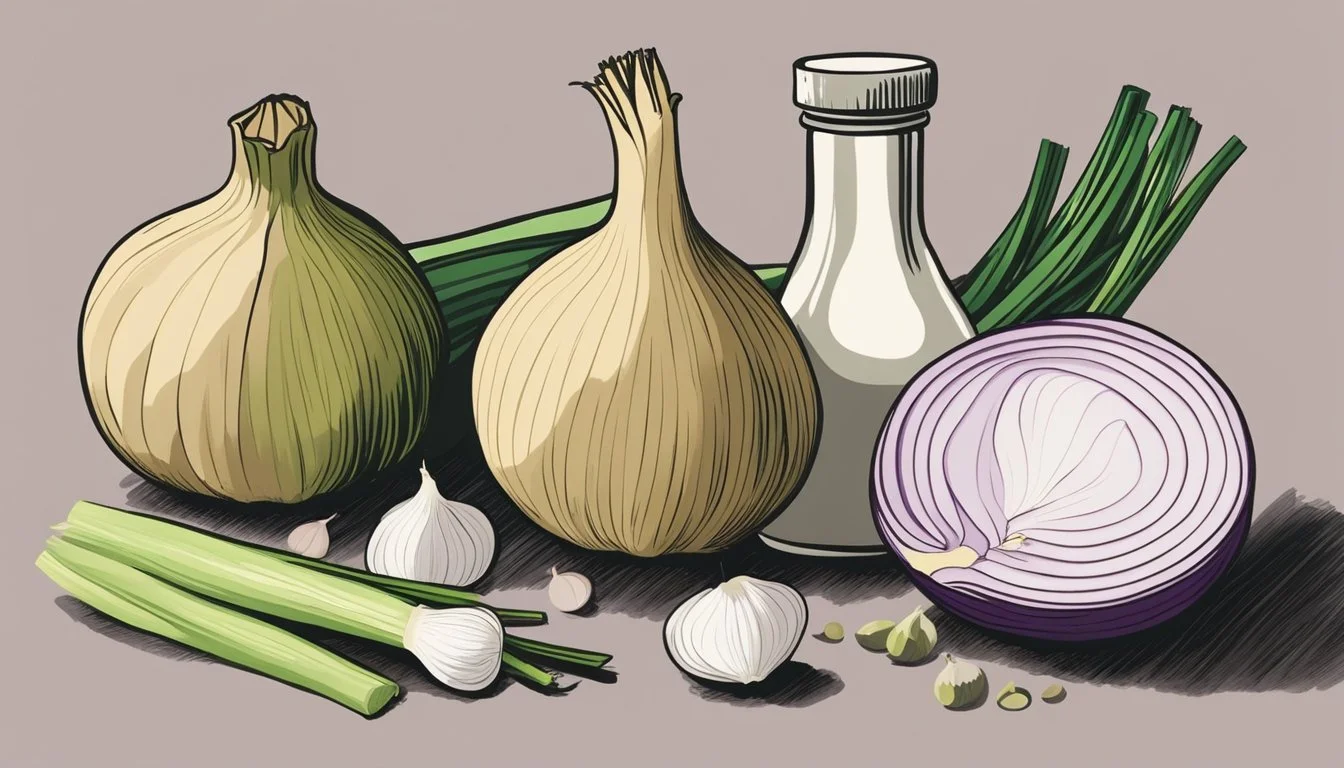Walla Walla Onions Substitutes
Best Alternatives for Any Recipe
When you find yourself in need of a substitute for Walla Walla onions, knowing the right alternatives can make all the difference in your dishes. These sweet onions, known for their mild flavor, add a unique touch to meals. One of the best substitutes for Walla Walla onions is the Vidalia onion, which shares a similar sweetness and can be used in the same quantity.
Another excellent option is the Texas 1015 onion, which offers a mild and sweet profile. Maui onions also provide a comparable sweetness with a slightly different flavor, ideal for adding a touch of the exotic to your recipes. These versatile substitutes ensure you can maintain the character of your dish even when Walla Walla onions are not available.
Using yellow onions or even potato onions can work in a pinch, although they might introduce slightly more pungency or bitterness. Experiment with these alternatives, and you'll find the perfect match for your culinary needs, keeping your recipes delicious and balanced.
Understanding Walla Walla Onions
Walla Walla onions are renowned for their sweet flavor and mild, juicy texture. These onions are grown exclusively in the Walla Walla Valley and are a key ingredient in many culinary applications due to their unique characteristics.
Characteristics of Walla Walla Onions
Walla Walla onions are a specific type of sweet onion known for their low sulfur content, which contributes to their mild taste. These onions are characterized by their high sugar and water content, leading to their signature sweetness and juiciness.
They are typically large and round with a thin, papery skin that is easy to peel. The size and shape can vary, but they generally have a uniform appearance. The soil in Walla Walla Valley contributes to these distinct characteristics, as it provides the perfect growing conditions for these sweet onions.
Culinary Uses of Walla Walla Onions
Walla Walla onions are versatile in the kitchen due to their mild and sweet flavor. They are a popular choice for raw preparations, such as salads and sandwiches, where their sweetness enhances the dish without overpowering other ingredients.
These onions are also excellent for grilling and roasting. When grilled, they develop a caramelized exterior while maintaining their juicy interior. Roasting whole Walla Walla onions at high temperatures amplifies their natural sweetness, making them a delicious side dish.
Their mild flavor and tender texture make them suitable for a variety of recipes, including soups, stews, and sautés. These onions can easily replace other sweet onions in recipes, providing a unique taste that enhances overall dish flavor.
Common Onion Varieties in Cooking
Onions come in various types, each bringing unique characteristics to a dish. Here’s an exploration of the most common onion varieties used in cooking, highlighting their specific flavors and uses.
Yellow Onions
Yellow onions are a staple in many kitchens. They have a strong, slightly sweet flavor that mellows when cooked, making them versatile for soups, stews, and sauces.
These onions have a golden-brown skin and high sulfur content, contributing to their pungency. Yellow onions are great for caramelizing due to their balance of sugar and sulfur. They are also known as brown onions in some regions.
Sweet Onions
Sweet onions, such as Vidalia, Walla Walla, and Maui onions, have a sweeter, milder flavor compared to other varieties. Their lower sulfur content and higher water content make them ideal for raw applications like salads and sandwiches.
They are often larger and have a lighter skin. Cooking them brings out even more sweetness, making them perfect for onion rings and roasting.
White Onions
White onions have a sharp, clean flavor that is less sweet than yellow onions. They are commonly used in Mexican cuisine, as their crisp texture holds up well in salsas and guacamole.
These onions have white, papery skin and a higher moisture content. They are great for adding a sharp bite to dishes, and their milder flavor when cooked makes them flexible for various recipes.
Red Onions
Red onions are known for their vibrant color and distinct, slightly sweet flavor. They are often used raw in salads, sandwiches, and pickles due to their mild bite.
Their purplish-red skin and layers make them visually appealing. Red onions are also good for grilling and roasting, which enhances their natural sweetness while preserving some crunch.
Spanish Onions
Spanish onions are large, yellow or white onions with a mild and sweet flavor. They are often used similarly to yellow onions but have a less intense taste. Their larger size makes them ideal for dishes where a lot of onion is needed.
They are commonly used in cooked dishes like stews and roasted vegetables. Their balanced flavor complements a wide range of ingredients without overpowering them.
Other Specialty Onions
Specialty onions include varieties like cipollini onions, which are small and flat with a sweet taste perfect for caramelizing, and green onions, known for their long, slender shape and mild flavor suitable for garnishing and stir-fries.
Each type has its own unique culinary uses. These specialty onions add distinct flavors and textures, enhancing dishes in ways that common onions might not. They provide chefs with additional options to refine the taste of their creations.
Optimal Walla Walla Onion Substitutes
When seeking alternatives to Walla Walla onions, certain options like Vidalia onions, Maui onions, Texas Sweet onions, shallots, and leeks stand out for their mild, sweet characteristics. Each substitute provides unique qualities that make them suitable replacements in various dishes.
Vidalia Onions
Vidalia onions are an ideal substitute for Walla Walla onions. Known for their sweetness, Vidalia onions offer a similar flavor profile. These onions are harvested from Georgia and have a thin skin, which makes them easy to peel. Vidalia onions are an excellent choice for salads, sandwiches, and raw dishes due to their mild taste and low sulfur content, enhancing sweetness when cooked.
Maui Onions
Maui onions, another sweet variety, are grown in Hawaii. These onions are less pungent compared to other types, making them suitable for people who prefer a milder flavor. With a crisp texture and sweetness, Maui onions are perfect for grilling, roasting, or adding raw to salads and salsas. Their slightly tropical note can add a unique twist to dishes.
Texas Sweet Onions
Texas Sweet onions are a specific type of sweet onion cultivated in Texas. These onions are often used as a direct substitute for Walla Walla onions due to their similar taste and texture. Texas Sweet onions are well-suited for cooking applications such as caramelizing, frying, or using in soups and stews. They hold their shape well when cooked, adding both flavor and texture.
Shallots
Shallots provide a blend of sweet and slightly spicy flavors. Though smaller than Walla Walla onions, shallots can be used as substitutes in many recipes. When cooked, their sweetness intensifies, making them great for sauces, dressings, and garnishes. Shallots also have a finer texture, which can be beneficial in dishes requiring a more delicate touch.
Leeks
Leeks offer a mild, sweet flavor that can effectively replace Walla Walla onions in various recipes. They have a unique structure with a white base and green tops. Leeks are commonly used in soups, stews, and quiches. It's important to clean them thoroughly to remove any dirt trapped in the layers. Leeks can be sautéed, roasted, or used as a flavor base in many dishes.
Other Substitutes
Other viable substitutes include yellow onions and white onions, which are more commonly available. Though not as sweet as Walla Walla onions, they can be used in cooked preparations where the strong flavor mellows. Red onions can also be considered for raw applications, as they bring a slightly sweet and tangy taste. Green onions or scallions are suitable for garnishing, offering a mild onion flavor without overpowering the dish.
Selecting the Right Substitute
Choosing the best substitute for Walla Walla onions requires careful consideration of various factors such as flavor, sweetness, and texture. Each option should balance the desired characteristics to ensure a similar culinary result.
Factors to Consider
When selecting a substitute for Walla Walla onions, several key factors come into play. The most important include flavor profile, sweetness, and texture.
Walla Walla onions are known for their mild and sweet flavor. It's important to choose an onion that mirrors these qualities as closely as possible.
Sweet onions like Maui or Texas 1015 are often excellent choices. They have similar sweetness due to their sugar content. White onions can also serve as substitutes, though they typically carry a slightly stronger pungency.
Yellow onions offer a good balance of mildness and sweetness, which can also make them effective substitutes. Considering how the chosen substitute will perform in various cooking methods—such as raw applications, sautéing, or roasting—is equally important.
Flavor Profile Matching
Matching the flavor profile is crucial when substituting Walla Walla onions.
Walla Walla onions have a unique sweet and mild taste due to the low sulfur content in the soil where they are grown. Look for onions that can replicate this specific balance of sweetness and mildness.
Sweet onions like Vidalia and Maui are top contenders for their similar profiles. Shallots also offer a mild flavor with subtle hints of sweetness, making them suitable for many recipes calling for Walla Walla onions. Scallions can add a mild, slightly sweet touch to raw dishes like salads and salsas.
Although red onions are more pungent, they can be used in smaller quantities to prevent overpowering the dish. Understanding these nuances ensures a closer match to the desired culinary outcome.
Using Onion Substitutes in Recipes
When Walla Walla onions aren’t available, knowing how to use substitutes can ensure that flavor and texture are maintained in both raw and cooked dishes. Different onion varieties can suit specific recipes and preparations like salads, soups, and salsas.
Raw Preparations
In salads, salsas, and other raw dishes, onions like white onions, Maui onions, and scallions work well. These varieties offer a balance of sweetness and crunch without overpowering other ingredients.
White onions are slightly more pungent but still render a refreshing taste. Maui and Vidalia onions offer a sweeter flavor akin to Walla Walla onions. Dice these onions finely to ensure even distribution and a consistent taste with every bite.
Cooked Dishes
In cooked recipes, a range of onions can be effective substitutes depending on the dish. For soups and sauces, yellow onions are a great choice due to their robustness. They hold up well during long cooking times, enhancing dishes like French onion soup and other hearty soups.
Caramelizing yellow onions can bring out their inherent sweetness, adding depth to recipes that call for Walla Walla onions. Use white onions and shallots for stir-fries, grills, and roasts. They maintain texture and blend seamlessly with other ingredients.
Specialty Applications
For specialty applications like French onion soup or grilled onions, some unique substitutes can shine. Vidalia onions and Texas sweet onions are excellent due to their high sugar content. They caramelize beautifully, resulting in rich, sweet onion flavor perfect for these dishes.
When frying or grilling, Spanish onions can also be a substitute, offering a similar robust flavor profile. They are versatile and hold their shape and flavor well under high heat, making them ideal for toppings and sides.
Utilizing the right type of onion substitute can maintain the integrity of your recipes, ensuring that the desired taste and texture are achieved.
Alternative Ingredients for Onion Flavor
Selecting the right substitutes for Walla Walla onions can enhance your dishes without compromising on flavor. Various alternative ingredients can replicate the mild, sweet, or pungent taste that onions provide, including different alliums, powders, and vegetable bases.
Garlic and Other Alliums
Garlic and chives offer a robust flavor alternative to Walla Walla onions. Garlic provides a pungent and spicy kick, which can be mellowed by roasting or cooking.
Chives, with their mild and slightly onion-like taste, work well raw in salads or as a garnish.
Additionally, scallions, also known as green onions, can be used both raw and cooked, offering a milder and sweeter flavor suitable for soups and stir-fries.
Onion Powder and Granules
Onion powder and granules are convenient substitutes that bring a concentrated onion flavor to dishes.
Use onion powder when you need a strong onion taste without the texture of fresh onions. A small amount, such as a teaspoon, can replace a small onion.
Dried onion flakes are another option, providing a milder but constant onion taste when rehydrated. Both forms work great in soups, stews, and marinades.
Fennel Bulb
The fennel bulb presents a unique alternative with its mildly sweet and slightly anise flavor.
Chopped fennel bulb can mimic the texture of onions in cooked dishes. Use it in equal parts to onions in recipes like roasts, sautés, or soups.
Its natural sweetness makes it a good choice for dishes where you want to add complexity without overpowering other flavors.
Sofrito Base
Sofrito is a versatile blend used in many Latin American cuisines, consisting of various ingredients including onions, garlic, and peppers.
This cooked aromatic base can be an excellent onion substitute, offering a depth of flavor that complements stews, sauces, and rice dishes.
Sofrito's mix of ingredients gives it a rich, savory profile that enhances the overall taste, making it ideal for incorporating into a variety of recipes.
Each of these alternatives can effectively replace Walla Walla onions in various dishes, ensuring that the desired flavor profile is maintained or even enhanced.
Managing Flavor and Texture in Substitutions
Different onion varieties provide unique flavors and textures. When substituting for Walla Walla onions, consider changes in cooking techniques, water content, and sweetness to achieve similar results.
Adjustments in Cooking Techniques
When substituting Walla Walla onions with other types, it's crucial to adjust cooking techniques to account for differences in flavor and texture. For example, white onions have a slightly stronger pungency than Walla Walla onions. Cooking longer at a lower heat can help to mellow this pungency and bring out the sweetness.
Yellow onions are another common substitute; they are more pungent and less sweet when raw. Caramelizing or roasting them slowly can balance out their stronger flavor, achieving a closer match to the sweetness of Walla Walla onions.
Shallots, while sweeter than many other onion types, have a delicate texture. Sautéing or gently frying them helps maintain their subtle flavor and avoids overcooking, ensuring they do not become mushy.
Accommodating Water Content and Sweetness
Water content and sweetness are key factors to consider when substituting Walla Walla onions. They are known for their high water content and distinct sweetness. White onions, though similar, have less water, so it might be necessary to add a bit of water or broth to recipes to keep them moist.
Yellow onions, with their more robust flavor, can dominate a dish if not handled properly. Cooking methods like slow cooking can help break down the fibers and increase sweetness. Likewise, adding a pinch of sugar while cooking can mimic the sweetness of Walla Walla onions.
Shallots are a good substitute due to their natural sweetness. Finely chopping or slicing them thinly can help blend their flavor more consistently into dishes, ensuring an even distribution of sweetness and texture.
In all substitutions, the key lies in adjusting both cooking techniques and considerations for water content and sweetness to maintain the integrity of the dish.




